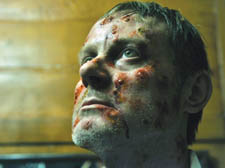|
|
 |
| |

Smallpox victim and debtor Castell (Adam Redmayne) History’s Hardest Prison |
Ex-con goes back inside a prison’s history
Piers Hernu was arrested in Nepal and imprisoned for four years for gold smuggling. Now he has made a documentary about the history of a notorious British prison, writes Dan Carrier
THE parallels between today and the 1720s are obvious, according to Camden Town-based TV presenter Piers Hernu.
A credit boom followed by a massive stock market crash, followed quickly by a huge rise in bankruptcies and thousands of ordinary people being out of pocket.
We have endured our own Credit Crunch – while the investors of the 1720s were victims of a pyramid-style investment scandal called the South Sea Bubble.
But while the human misery caused by such speculation may be the same, if you lost your cash 300 years ago and had creditors on your tail, you faced being sent to Britain’s harshest prison: the monolithic Fleet, situated in the heart of the City.
Piers has turned his film camera in the direction of the prison and produced a wide-ranging history of the institute – and discovered how, unintentionally, the South Sea scandal led to penal reform.
“With so many blue bloods losing fortunes, the cells of the Fleet Prison swelled massively – and offered unscrupulous warders the chance to get very rich, very quickly,” he states.
A particularly sadistic warden called Thomas Banbridge took over the prison at the time of the crash and delighted in torturing his charges, cranking up the payments they had to give him – making it virtually impossible for them to settle any outside debts and therefore be granted freedom.
“He was a mix between a total sadist and an astute businessman,” says Piers.
Using such instruments as leg shackles designed to cut and irritate the skin and a vile piece of ironmongery that fixes the neck and the wrists in an uncomfortable, crouching position, his regime caused the deaths of many and boosted his personal fortune by thousands of pounds.
But after his behaviour led to the death of an aristocratic prisoner, and saw him terrorise hundreds of other well-connected bankrupts, the government commissioned a report into the debtors’ prisons and started a slow process of penal reform.
Piers’s interest in prisons stems from a horrific experience he had in his 20s: he is an ex-convict himself. He was arrested and convicted of gold smuggling in Nepal, and found himself serving a four-year sentence in a dingy jail.
“It was not how I imagined my life would pan out,” he says wryly.
Piers had thought he had it all. After leaving university, he got a job as a City trader, having visions of high earning, hard-playing, wide-boy antics that epitomised the City in the 1980s.
Piers worked on an options desk for two years but he joined in 1987, a bad time to be in the business. The 1980s excess had been replaced by a post-Black Wednesday recession. To make things worse, personal disaster struck. Piers fell ill and had his tonsils removed. But what should have been a straightforward operation led to complications with his thyroid gland.
Listless, unable to get back to work, his condition took a while to be diagnosed and by then he’d been forced to quit his job, was laid low by ME – the “yuppie flu” – and had holed up at his mum’s Sussex house to recover.
He slowly got better – it took two years – and decided to rethink what to do with his life.
“I decided to do some travelling,” he said.
He eventually arrived in Hong Kong and landed a job teaching English.
“I was living in a hostel and was approached by men who wanted to smuggle gold into Nepal.
“We’d get paid £2,000 for our troubles, and other people living with me who had done it before could vouch for how easy it was,” he recalls.
“They strapped gold to me in a denim waistcoat weighing around four stones and I caught a flight, confident this was the easiest day’s work I had ever done.”
But within moments of touching down, he had been arrested and flung into prison.
The penal system in Nepal does not have a split between the judiciary and the police: he was found guilty in a matter of days by the same people who had arrested him in the first place, and was flung into a dingy hole run by other prisoners. He did not serve all his time – a relative with a diplomatic background began working tirelessly on his behalf and managed to get the sentence commuted.
But the experience piqued his interest in prisons and prison reform, and led him to uncover the story of what he has dubbed “Britain’s hardest prison” – the title of his documentary.
And there is a further, worrying parallel Piers finds between the 1720s and today: “The prisons were back then run as private companies, private domains, with the emphasis on maximising profits, and creaming off cash paid for board and lodging by the wardens in charge,” he says.
“To think we are going through a period where it is government policy for private companies to build and manage prisons themselves is a horribly frightening thought. Maximising profits leads to cutting corners – a terrible prospect when you are talking about the penal system and helping those inside reform.”
•
|

|
 |
Your comments:
The Lenkiewicz exhibition is stunning from the remarkable St Eustace sculpture to the drawings featuring unicorns, tigers and Elvis! The skeletons and skulls were my particular favourite along with the octopus drowning the Titanic. The surroundings are fabulous; the Pite architecture lends itself so well to the mood. I admit I have a particular fondness for
the building having worked there for 26 years.
J. Trend-Hill
|
|
 |
|

